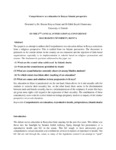| dc.description.abstract | This paper is an attempt to address the Comprehensive sex education debate in Kenya curriculum from a religious perspective. This is tackled from the Islamic perspective. The discussion is premised on the current debate in the country on sex education and the rejection of faith based organizations especially in its implementation in schools based on religious persuasions and reasons. The fundamental questions addressed in this paper are:
(1) What are the sexual values addressed by Islamic sharia
(2) What are the sexual lessons permitted by Islam?
(3) What are sexual behavior currently observed among Muslim students?
(4) To which extent does Islam allow teaching of sex education?
(5) What are causes and solutions to teen pregnancies in Kenya?
Sex education in Islam is paradoxical: on the one hand, Islam allows for it and actually calls for students to exercise their sexuality but, on the other hand, there seems to be discrimination between male and female sexuality due to a misinterpretation of the scriptures. It seems like boys are given more rights with regard to the expression of their sexuality. The combination of these contradictory views with the current trends on teenage pregnancy leads to an inquiry of the Islamic perspective on sexual education | en_US |

